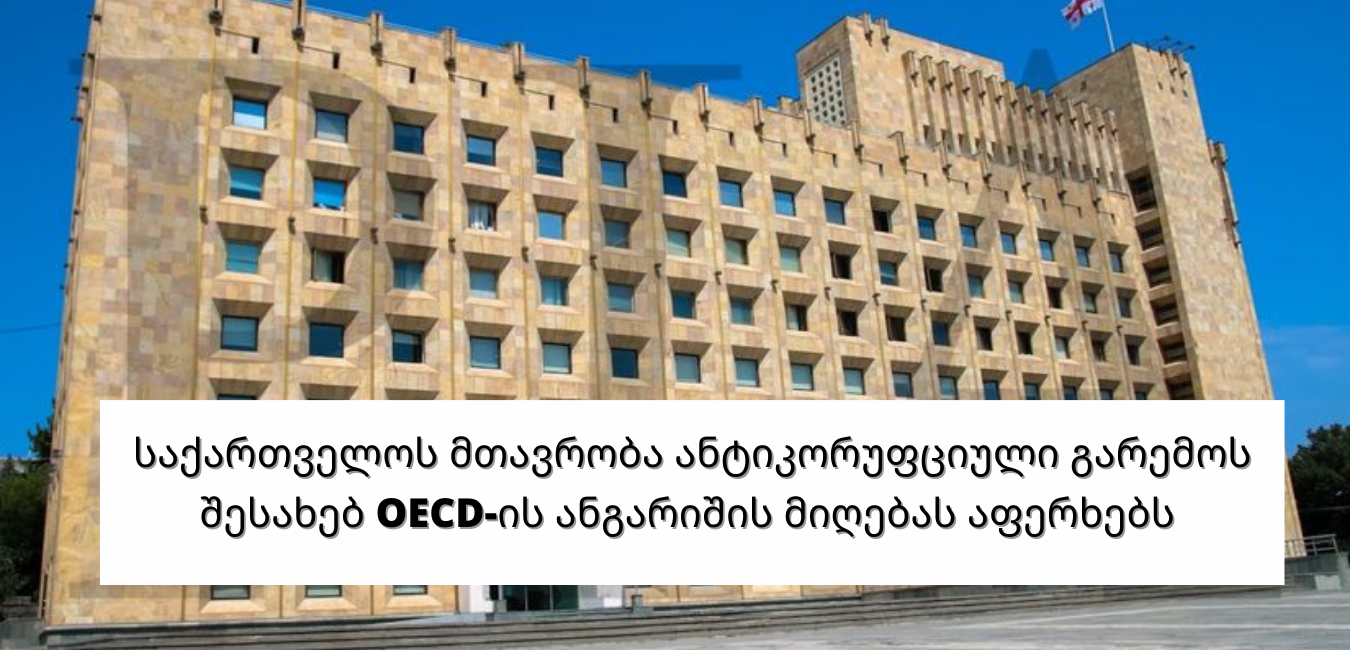NEWS

At the 21st plenary session on October 26, 2021, the Anti-Corruption Network of the Organization for Economic Cooperation and Development (OECD/ACN) was planning to approve a report on the assessment of the anti-corruption environment in Georgia. However, the Georgian government refused to give its approval to the report and demanded additional time with the aim of amending the text of the document. The report was prepared as part of the 5th round of monitoring by the OECD/ACN (using a new pilot methodology), which studies the country’s anti-corruption environment, including the existence of risks of high-level corruption.
The Georgian delegation to the 21st plenary session of the OECD/ACN was distinguished by non-constructive and con-collegial statements in relation to the authors of the report. The plenary session was also attended by representatives of other countries of the region, the EU, the USAID, the UN Development Program, and other international actors. This step of the Georgian authorities causes a serious damage to the country’s external image and to its long-standing productive relationship with the OECD/ACN.
We believe that the Georgian government’s refusal to give its approval to the report prepared by the OECD/ACN monitoring mission causes damage to Georgia’s reputation and contradicts the constitutionally reinforced will of the Georgian people to build a European, democratic, corruption-free country with an independent judiciary. We call upon the government to cooperate constructively with the monitoring group and to ensure the approval of the pilot report and its public availability.
The OECD consists of 38 economically and democratically developed countries and assists more than 100 countries of the world, including Georgia, in the implementation of economic and democratic reforms. Cooperation with the OECD is extremely important for Georgia, as a large part of the aid allocated for the country comes precisely from the OECD member states.
A part of this aid is a program titled the Anti-Corruption Network for Eastern Europe and Central Asia (OECD/ACN), as part of which the anti-corruption environment of the participating countries is periodically checked and recommendations are given about concrete reforms.
In 2020, the OECD/ACN developed new indicators for 13 large performance areas of the anti-corruption systemon the basis of international practice and experience. The countries are to be assessed annually according to these indicators from 2022.
Before the introduction of the indicators and methodology in practice, the governments of the five countries of the Eastern Partnership (EaP) – Georgia, Ukraine, Moldova, Armenia, and Azerbaijan – agreed to the implementation of the pilot monitoring in the framework of the EU for Integrity program. According to preliminary agreement, considering the character of the monitoring round, the OECD/ACN was not to release the scores received by the countries and the ratings of fulfillment of indicators in each performance area, although, after being approved at the plenary session, the descriptive part of the monitoring report was to become publicly available.
The OECD/ACN monitoring mission assessed the following areas related to corruption:
- Implementation of the national anti-corruption policy by the government of Georgia;
- Practical enforcement of the Law on Conflict of Interest and Corruption;
- Functioning of the system of asset declarations of public officials;
- Protection of whistleblowers in practice;
- Systems of the judiciary and the prosecutor’s office;
- The system of public procurement;
- Effectiveness of investigation of cases of high-level corruption.
More generally, the Georgian government has stalled the implementation of anti-corruption reforms in recent years. The Interagency Anti-Corruption Coordination Council, which is responsible for determining, monitoring, and assessing the country’s anti-corruption policy, as well as for fulfillment of international recommendations, last met two years ago. The Secretariat of the Anti-Corruption Council is, in fact, non-existent, as it hasn’t employed a single person for more than seven months. As of the end of 2021, the Anti-Corruption Action Plan for 2021-22 is yet to be approved. The Open Government Partnership (OGP) reform has been stalled for two years as well.
All of the above indicates that combating corruption is no longer a priority for the country’s authorities. We call on the authorities to take account of the recommendations given by local and international organizations and to acknowledge the challenges that exist in the country, which is critical for the implementation of successful reforms.
SHARE: